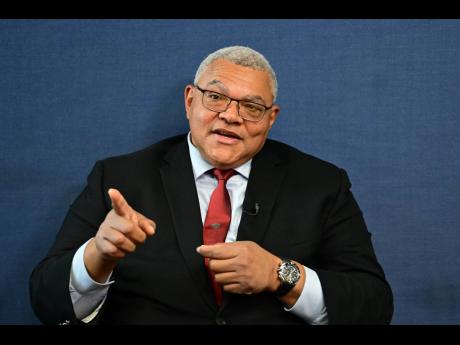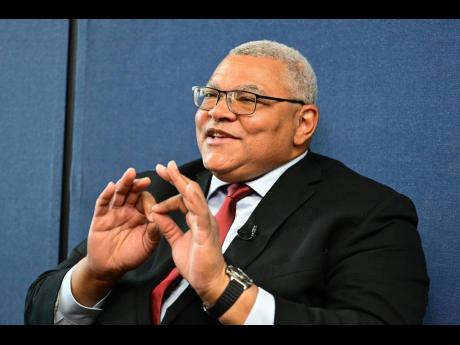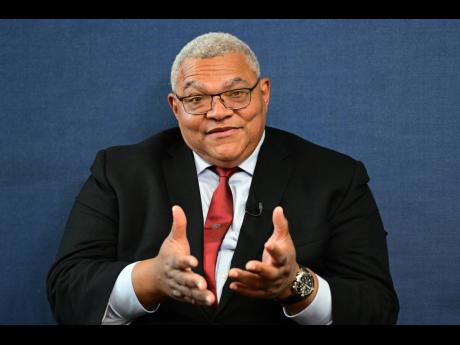The trailblazing Prof John-Paul Clarke
Calabar Lion soars in aerospace engineering, redefining education
Neither he nor anyone else expected that he would become a clergyman like his late father, Anglican priest the Reverend Dr Gervais Clarke. They also didn’t anticipate that he would become a scientist, following in the footsteps of his equally well-regarded mother, Joan (nee Binger), who a paediatrician for more than two decades at the Bustamante Hospital for Children and herself the daughter of a clergyman.
And although he, too, was unsure of his destiny, the young lad knew one thing was for certain: he loved everything about aeroplanes.
Professor John-Paul Clarke would have been just fine being introduced as a “Calabar Lion”, having been moulded by the Red Hills Road, St Andrew-based boys’ school.
Now, he is professor of aerospace engineering and engineering mechanics at the University of Texas in the United States and he holds the Ernest Cockrell Jr Memorial Chair in Engineering.
Before that, he was a professor at Georgia Tech, having also done a similar professorial stint at his alma mater – the Massachusetts Institute of Technology (MIT), where he had also completed undergraduate and graduate degrees after matriculating in 1987 after leaving Calabar.
Between then and now, he has “done some other things”, like starting successful companies, the most recent of which is Universal Hydrogen – a company dedicated to the development of a comprehensive carbon-free solution for aviation.
“First and foremost, I am an educator,” is how Clarke introduced himself during a recent sit-down with The Sunday Gleaner.
He noted that the die was cast for him to attend Calabar High School, recalling his mother playfully asking what was the second choice after Calabar. His father said he couldn’t spell it.
“I had the benefit of having a priest as a father and a paediatrician as a mother. One thing about them, they were grounded … ,” Clarke told The Sunday Gleaner.
This upbringing and the associations he formed crossed the bridges of uptown and downtown, as the boy who grew up in Meadowbrook Estates felt no unease when in the company of persons from downtown.
“It instilled in me the knowledge that it is really great to grow up in Jamaica; you are still able to experience life at all levels. My fondest memory of being able to move from uptown to downtown was one day playing dominoes with the porters at Bustamante Hospital as a young boy and then I was at King’s House for dinner that same evening,” he recalled.
A strong supporter of the Calabar Old Boys’ Association, he is actively giving back to current students at various levels, along with its Atlanta chapter, and also funds scholarships honouring his parents’ memories.
Students from St Hugh’s High School, the alma mater of his mother, vie for the scholarship in her memory and are selected using the same formula applied to those at Calabar seeking the other.
Clarke spends three days per week in the Cayman Islands as he is chairman of Cayman Airways and is in the United States on the other days.
On a recent trip to Jamaica – which he visits at least twice per year – he delivered the keynote address at the launch of the Faculty of Science and Technology’s Endowment Fund at The University of the West Indies.
As the Cockrell Jr chair, he knows the value of endowment funds, which provide funding for important areas of research to benefit the university and country.
“Endowment funds give you the freedom and resources to do the things, develop the talent that industry needs, but more importantly, doesn’t know that it will need, because the truth of the matter is you have to know your customer, but its better if the customer knows him or herself … ,” he reasoned.
Using dominoes to teach mathematics
One area Clarke would like to research is using dominoes to teach mathematics – a feared subject in the island with low passing rates.
“I am actually trying to get funding for a research project to develop a curriculum around dominoes for mathematics. It’s what we refer to in maths programming as a stochastic programme, that is, what’s the best decision to make now, given what other people can do; what you can do in response to that, and then what they do in response to that. So there a whole branch of mathematics around that which involves probability and statistics … ,” he said.
Clarke added that in playing dominoes, there are individuals who “could barely add two things together”, but who knew exactly who had which card in the game, who would play when, and who would take a pass – having no card to play.
“I really would love for us as a country in trying to address mathematics to think about having a dominoes-based curriculum – maybe not curriculum, but a domino-based module to probability and statistics and decision-making, because I think, especially for boys, it would resonate well. And one thing about dominoes, it doesn’t matter where you are in society, Jamaican men, especially, and a growing set of women pride themselves on their dominoes skills,” he observed.
“I think it would be a great project for mathematics education.”
Assessing the local education system, Clarke said that small island development states like Jamaica often imitate what is seen elsewhere – a relic of the island’s colonial past.
According to him, such countries hold on to such things longer than they should, maintaining the same approaches irrespective of the changing society and to their detriment.
Jamaica, he said, was struggling with the attention span of learners at the tertiary level, for example.
Clarke said learners want things in small bites, but institutions are still maintaining 40- and 50-minute classes.
With video technology available, the system should think more seriously about matching delivery to the attributes of the receivers, he argued.
“What we are doing, in many cases, is saying, ‘This is the way we are going to teach you and you better adapt to how we teach’, as opposed to saying, ‘We understand that you are different and we have to change how we deliver stuff to better match you because things are changing’,” he said.
No one, he further added, wants to sit down and listen to United Nations-type presentations, only to hear someone say, “as I said earlier” – which was 45 minutes before.
“I do think we need to change the way we create educational content – modularise things, allow people to get things in different order. That’s why the Internet has proven so beneficial for synchronous learning,” he proffered.
Value of tech, research
Professor Clarke said there are proven benefits to the use of technology in education, citing one way in which it can aid in teaching.
He said it is well known that the remuneration is poor and there is diminished respect for the teachers and teaching, causing many educators to leave the profession. But he suggested that issues of teacher shortages could be tackled by “bottling what we have into master lectures” – using the most experienced lecturers to teach, rather than worry over not having specific teachers for specific subjects. While a school may retain particular subject teachers, he explained, they may not be the ones to teach particular modules, but select lessons from from video lectures done by master teachers.
“If we have lessons that are produced really, really well, we should bottle it up. And if somebody displays a method better than me, let’s bottle it up. Let’s figure out who are the best people in explaining concepts. Who are the best people at creating audiovisual aids/demonstrations? Let’s bottle that up, and then, let’s use the teachers to do the tutorials to answer the questions around that,” he suggested.
Clarke said that Cambridge University has adopted the model, where every student has a non-faculty tutor with whom they meet weekly and questions are asked around the lecturers delivered.
“So let’s separate delivery and exposition from tutorial,” he said, which would be a good first step to dealing with the departure of teachers and changing the approach to match students’ learning.
A well-curated lesson by a stranger, he noted, could increase learning multiplefold.
But does Jamaica have the capacity for the overhaul being suggested? Clarke believes so.
“I have been impressed and as I go around the Caribbean people have a lot of respect for the technocrats in Jamaica. I know they have the Orlando Patterson report, and the fact that they (Government) commissioned the report tells you that there is a recognition that there is need for change,” he said.
He believes that the country will find the resources if it considers the matter serious enough.
As the Cockrell Jr chair, which he considers a “big deal”, Clarke receives US$60,000 per year for research. He wants Jamaica to see the value of continuous research, which, he believes, “accelerates innovations”.
Clarke is described as a leading expert in aircraft trajectory prediction and optimisation, especially as it pertains to the development of flight procedures that reduce the environmental impact of aviation, and in the development and use of stochastic models and optimisation algorithms to improve the efficiency and robustness of aircraft, airline, airport, and air traffic operations.
He is particularly interested in leveraging his expertise to enable increasingly autonomous aircraft-enabled mobility, especially in urban and regional settings.
He was tapped by the Biden administration to be a NASA board member.
“I am a member of NASA Advisory Council and I chair the Aeronautics Committee,” Clarke told The Sunday Gleaner.
His contributions to aerospace extend well beyond his research. He is the founding chair of the AIAA Human-Machine Teaming Technical Committee, was co-chair of the National Academies Committee that developed the US National Agenda for Autonomy Research related to Civil Aviation, and has chaired or served on advisory and technical committees chartered in related fields some of which required Congressional testimony.
While he has some concerns, Professor Clarke believes Jamaicans are limitless in what is achievable.



